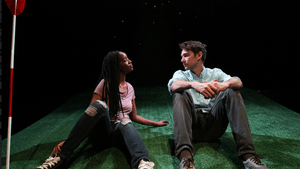Stay in the Loop
BSR publishes on a weekly schedule, with an email newsletter every Wednesday and Thursday morning. There’s no paywall, and subscribing is always free.
Lightning crashes
Theatre Exile presents Michael Hollinger's 'Sing the Body Electric'

Sing the Body Electric highlights playwright Michael Hollinger’s knack for crafting naturalistic dialogue and inherently sympathetic characters. But as seen in Deborah Block’s superbly acted and designed premiere production for Theatre Exile, the whole often feels like less than the sum of its parts.
That’s a shame because, at its best, the tender comedy/drama stands among the finest offerings in Philadelphia this season. It delicately explores the physical and mental wounds carried by ordinary people thrust into extraordinary circumstances, and examines the power of trauma in shaping interpersonal relationships.
Yet it is also often too elliptical. The characters’ motives remain largely unknowable, even as their actions prove relatable.
Smoldering attraction
The play follows two damaged families. Doris (Kimberly S. Fairbanks) moves to Florida in the wake of a difficult divorce, with teenage daughter Jess (Kishia Nixon) in tow. Jess has smarts and savvy to spare — Hollinger displays this early in a scene of sharply orchestrated banter between mother and daughter — but little drive to succeed in school. She particularly disdains physics, prompting Doris to hire Lloyd (Anthony Lawton), a former high-school science teacher, as a private tutor.
Lloyd's son, Blake (Trevor William Fayle), belongs to a support group run by Doris. Although the purpose of the group never gets explicitly stated, we quickly learn that Blake survived a lightning strike that killed his girlfriend and left him literally and figuratively scarred. Jess only appears interested in physics as it pertains to Blake’s accident; at an early tutoring session, she unsubtly asks Lloyd to explain how lightning works.
Hollinger’s greatest asset is his ability to infuse familiar or predictable situations with surprising depth. This comes across best in the relationship between Jess and Blake, which avoids the cutesy trappings of high school romance plots. As played by confident, charming Nixon, Jess fixates on Blake with an almost predatory desire; she won’t stop until she knows the secrets of his pain. Fayle responds with stoic grace, building layers of meaning into the simplest words.
The pair's terse, sometimes uncomfortable interactions capture the awkward reality of young-adult speech without becoming cloying or artificial. You can sense each learning what makes the other tick through even casual rejoinders. I would happily watch an entire play devoted to their relationship — due, I’m sure, in large part to the unforced chemistry between Nixon and Fayle.

Shorting out
Doris and Lloyd get a romantic subplot of their own, suffused with the gravity of middle age and second-time-around skittishness. Fairbanks and Lawton build a comfortable rapport that suggests mutual attraction rather than a coupling of convenience. A master of disarming self-consciousness, Lawton makes an ideal foil for Doris, whom Fairbanks plays with the right amount of caution and excitability.
Although Block directs with smoothness and an eye for arresting stage pictures (Colin McIlvaine designed the slightly surreal set), the play begins to sputter around its midway point. Hollinger suggests that each of the principal characters harbors a staggering secret — sometimes slyly, sometimes with a heavier hand. But the weight of each secret, and how it affects the world of the show, remains largely unresolved.
Is Jess meant to be a chaos agent, a curious teen, or some combination of both? To what degree has Blake’s ordeal influenced his relationship to the world? Why does Doris remain so guarded with information about her past? And what exactly lies beneath Lloyd’s ostensibly placid surface?
Hollinger teases answers but stops short of even the most open-ended explanation, which causes me to wonder whether the play has an endgame at all. (A fifth character, though entertainingly played by Mary Lee Bednarek, seems mostly expendable).
Hollinger further seems preoccupied with metaphors he fails to fully flesh out. Electricity is most obvious, supported by Masha Tsimring’s extended blackouts and flickering stage lights. But he also introduces strands about authority (Lloyd as teacher, Doris as therapist) and self-harm (suicide attempts, fetishizing danger) that aren’t satisfyingly explored.
I left Sing the Body Electric feeling like I saw a solid workshop rather than a successful finished product. Hollinger already has most of the pieces required to build a captivating and compelling drama. Some just need a little more spark.
What, When, Where
Sing the Body Electric. By Michael Hollinger, Deborah Block directed. Theatre Exile. Through May 13, 2018, at the Latvian Society, 531 N. Seventh Street, Philadelphia. (215) 218-4022 or theatreexile.org.
Sign up for our newsletter
All of the week's new articles, all in one place. Sign up for the free weekly BSR newsletters, and don't miss a conversation.

 Cameron Kelsall
Cameron Kelsall